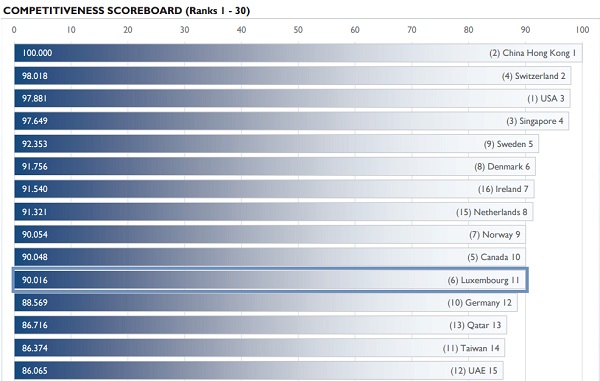
The IMD World Competitiveness Yearbook for 2016 has seen Luxembourg drop five places from last year to 11th out of a total of 61 countries.
Whilst ambitious political announcements such as the referendum on foreigners voting, the "omnibus" draft law, hopes for a tax reform and plans in the areas of housing, public transport and land use planning provided a strong platform for Luxembourg to springboard to 6th place last year, in 2016 it was China Hong Kong, Switzerland, USA, Singapore, Sweden, Denmark, Ireland, the Netherlands, Norway and Canada completing the top ten, with the Grand Duchy just pushed out of the fray.
Following the news, the Luxembourg Chamber of Commerce has outlined the four pillars that servce to measure the evolution of Luxembourg's competitiveness, and the advantages they pose or challenges they face.
Economic Performance
According to the Chamber of Commerce, whilst "Economic Performance" remains the winning factor in Luxembourg's competitiveness, the country relinquished its top place in the sub-pillar of international trade. However, Luxembourg's commitment to the exchange of services and its efforts in tourism have seen it defends its third position on the podium. Growth in 2015 was strong, advancing 13 positions in the sub-pillar of national economy and to 6th place in economic growth.
For the second year in a row, the country has slowly but surely advanced in economic diversification, with this set to continue with pioneering projects such as the Third Industrial Revolution and spaceresources.lu.
The number one concern came as no surprise to the Chamber of Commerce as employment. Whilst job creation remains strong, the unemployment rate has not made much progress, rising from around 4% at the end of 2007 to 6.9% in 2015. In the price sub-pillar, low inflation saw Luxembourg advance ten spots, although the mismatch between supply and demand, both in the housing market (from 46th to 50th) and the non-residential market (from 46th to 48th) was said to be far from resolved.
Efficiency of Public Authorities
This pillar remained stable, belying the mood swings experienced in its sub-pillars. Public finances improved three places, although the Chamber of Commerce announced it expecte the falling Zukunftspak regime and pro-cyclical fiscal reform with high budgetary costs to result in a further deterioration in the next edition of the WCY.
Luxembourg's tax policy was not quite up to standards, leaving it 38th out of 61. There was also work to be done on legal and regulatory framework, which fell by 6 places, as well as on the side of ease in starting a business in terms of the number of days required, where Luxembourg is currently ranked 49th. However, the Chamber of Commerce granted that projects such as the introduction of a simplified Sàrl or the launch of a single point for the House of Entrepreneurship could have positive impacts in the future.
Business Environment
Although Luxembourg was ranked 16th Best Country to Start a Career by US News & World Report in 2016, its "Business Environment" pillar fell from 4th to 9th place with even greater losses experienced in the sub pillars of the labour market (-9 places); business management practices (-8 places); and attitude and values (-9 places).
According to the Chamber of Commerce, a priority in the labour market, as ever, is to attract skilled workers, with entrepreneurs no longer satisfied with their availability. Improvement, however, arrived in the form of finance, climbing from 10th to 4th place, and in the level of productivity and efficiency - a sub pillar which rose 3 ranks to stand second in the list, although the Chamber of Commerce warned that the implementation of a series of reforms remained crucial for the development of the Luxembourg economy.
Infrastructure
Luxembourg appears undecided regarding infrastructure, with the quality of air transport showing vast improvement whilst energy-related indicators continued to spiral, at odds with the country's 2020 target of bringing the share of renewable energy sources in final energy consumption to 11%.
In terms of technological and scientific infrastructure, the Chamber of Commerce deemed it necessary to further promote private-public partnerships to bring more young people from the world of science and engineering and to defend the country's privileged position in terms of national patents and its good ranking for intellectual property rights.
On the health and environmental side, Luxembourg relinquished 14 positions to other countries, with the Chamber of Commerce urging concrete steps to be taken in the field of the circular economy, whilst the results in education highlighted the need for an ambitious reform of secondary education.
Image from IMD World Competitiveness Scoreboard








